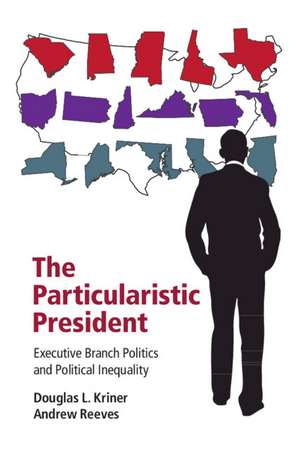The Particularistic President: Executive Branch Politics and Political Inequality
Autor Douglas L. Kriner, Andrew Reevesen Limba Engleză Hardback – 17 iun 2015
| Toate formatele și edițiile | Preț | Express |
|---|---|---|
| Paperback (1) | 258.96 lei 6-8 săpt. | |
| Cambridge University Press – 11 iun 2015 | 258.96 lei 6-8 săpt. | |
| Hardback (1) | 625.52 lei 6-8 săpt. | |
| Cambridge University Press – 17 iun 2015 | 625.52 lei 6-8 săpt. |
Preț: 625.52 lei
Preț vechi: 702.83 lei
-11% Nou
Puncte Express: 938
Preț estimativ în valută:
119.69€ • 124.98$ • 98.84£
119.69€ • 124.98$ • 98.84£
Carte tipărită la comandă
Livrare economică 15-29 aprilie
Preluare comenzi: 021 569.72.76
Specificații
ISBN-13: 9781107038714
ISBN-10: 1107038715
Pagini: 248
Ilustrații: 40 b/w illus. 5 maps 27 tables
Dimensiuni: 158 x 235 x 19 mm
Greutate: 0.48 kg
Editura: Cambridge University Press
Colecția Cambridge University Press
Locul publicării:New York, United States
ISBN-10: 1107038715
Pagini: 248
Ilustrații: 40 b/w illus. 5 maps 27 tables
Dimensiuni: 158 x 235 x 19 mm
Greutate: 0.48 kg
Editura: Cambridge University Press
Colecția Cambridge University Press
Locul publicării:New York, United States
Cuprins
1. Introduction; 2. The origins of presidential particularism; 3. Base closings and trade; 4. Disaster declarations and transportation grants; 5. Federal grants and presidential particularism; 6. The electoral rewards of presidential particularism; 7. Conclusion.
Recenzii
'In this well-informed and rigorous work, the authors challenge the view of presidential universalism with their finding that presidents routinely allocate federal resources to benefit their partisan and electoral constituencies. The fact that chief executives skew policy to the demands of the electoral college encourages us to reconsider our views of the presidency and the manner in which we elect its occupants.' George Edwards, University of Oxford
'Doug Kriner and Andrew Reeves have written a terrific book that is destined to shake up the presidency subfield. I, myself, will be arguing with it for a long time. Marshaling an eclectic array of data, Kriner and Reeves contend that presidents are not quite the national statesmen that they are made out to be. Rather, in their basic orientation toward distributive politics and disaster relief aid, presidents can be just as narrow-minded and shortsighted as legislators. Whether presidents and legislators are of a piece, well, that remains to be seen. But with this stimulating book, a gauntlet has been dropped.' William Howell, Sydney Stein Professor in American Politics, University of Chicago
'In a book that is beautifully crafted and filled with careful empirical analysis, Kriner and Reeves offer a forceful challenge to mainstream thinking on the presidency, arguing that presidents are just as particularistic in their approach to politics as members of Congress are and cannot be relied upon to counterbalance the latter's parochialism. This volume is destined to be controversial and to stimulate new thinking and research on the presidency.' Terry Moe, William Bennett Munro Professor of Political Science, Stanford University, California
'Political scientists, historians, students of communication studies and political rhetoric, and journalists write many books on the American presidency every year. Although these studies add incrementally to our understanding of executive branch politics, very few new books fundamentally reshape scholarly thinking about the presidency … Douglas Kriner and Andrew Reeves have written a book that meets this threshold, providing a systematic and empirical analysis of presidential efforts to target key constituencies in the electorate with public policy and federal resources … [they] have produced a well-written study that has the potential to reach a broad audience in political science. Scholars of the American presidency and public policy specialists will find The Particularistic President to be an important book that expands their knowledge about the strategic nature of presidential decision making and the implementation of federal policies.' Adam L. Warber, Congress and the Presidency
'Doug Kriner and Andrew Reeves have written a terrific book that is destined to shake up the presidency subfield. I, myself, will be arguing with it for a long time. Marshaling an eclectic array of data, Kriner and Reeves contend that presidents are not quite the national statesmen that they are made out to be. Rather, in their basic orientation toward distributive politics and disaster relief aid, presidents can be just as narrow-minded and shortsighted as legislators. Whether presidents and legislators are of a piece, well, that remains to be seen. But with this stimulating book, a gauntlet has been dropped.' William Howell, Sydney Stein Professor in American Politics, University of Chicago
'In a book that is beautifully crafted and filled with careful empirical analysis, Kriner and Reeves offer a forceful challenge to mainstream thinking on the presidency, arguing that presidents are just as particularistic in their approach to politics as members of Congress are and cannot be relied upon to counterbalance the latter's parochialism. This volume is destined to be controversial and to stimulate new thinking and research on the presidency.' Terry Moe, William Bennett Munro Professor of Political Science, Stanford University, California
'Political scientists, historians, students of communication studies and political rhetoric, and journalists write many books on the American presidency every year. Although these studies add incrementally to our understanding of executive branch politics, very few new books fundamentally reshape scholarly thinking about the presidency … Douglas Kriner and Andrew Reeves have written a book that meets this threshold, providing a systematic and empirical analysis of presidential efforts to target key constituencies in the electorate with public policy and federal resources … [they] have produced a well-written study that has the potential to reach a broad audience in political science. Scholars of the American presidency and public policy specialists will find The Particularistic President to be an important book that expands their knowledge about the strategic nature of presidential decision making and the implementation of federal policies.' Adam L. Warber, Congress and the Presidency
Notă biografică
Descriere
This book challenges the notion of presidents being the sole steward of American interests through an examination of a range of policies.


















